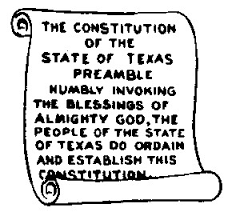There are many to vote on, and at least one to strongly oppose.
Texans will decide the fate of 14 constitutional amendments recently sent to the ballot by state lawmakers during the Nov. 7 election.
Many of the proposed amendments would create or alter funds to support:
- Higher education research
- Water infrastructure
- Gas-fueled power plants
- Broadband infrastructure
- Maintenance and creation of state parks
Several others would address taxes by:
- Raising the homestead exemption for homeowners from $40,000 to $100,000
- Creating some tax exemptions for medical equipment and child-care facilities
- Banning lawmakers from imposing “wealth taxes” without voter approval
Other amendments would affect Texans in certain professions by:
- Granting retired teachers cost-of-living raises
- Raising the mandatory retirement age for state judges
- Protecting farmers and ranchers from nuisance claims as cities around them grow
And two would impact Galveston and El Paso counties specifically, allowing Galveston County to eliminate the position of county treasurer and for El Paso County to use bonds for parks and recreation development.
[…]
Proposition 3 – HJR 132 “The constitutional amendment prohibiting the imposition of an individual wealth or net worth tax, including a tax on the difference between the assets and liabilities of an individual or family.”
What it means: Several states have proposed so-called “wealth taxes” in recent months, referring to a tax on a person based on the market value of assets they own, which can include real property and retirement accounts, minus their debts or liabilities, such as bankruptcies. Texas has not introduced this and does not have a similar tax.
Supporters of those taxes argue that the impact on the extremely wealthy would be minimal, that the definition of “wealth” can be defined in a way that best suits each state, and that it would help pay for costly programs without impacting lower income people. Critics say raising taxes on someone’s wealth discourages business and that the revenue from it will be less than anticipated. They also say that overall wealth would decline, which would result in less investment and loss of tax revenue from other sources, such as sales and property taxes.
This amendment would force lawmakers to ask voters for authorization before they could impose any new state taxes on residents that would be based on net worth or wealth.
Read the whole thing to get a capsule analysis of each proposition. Per Campos, the Chron has already endorsed four of them – two and five a couple of days ago, and four and nine before that, though for some reason those have only appeared in the print version. I’ve looked but have not seen them online.
Proposition 3, which would pre-emptively ban a non-existent and unlikely to be adopted anytime soon wealth tax – more to the point, it would require the passage of another amendment to allow the imposition of such a tax – is worthy of your opposition. For one thing, it should be clear that this would only be in the interest of the small number of people who might be subject to such a tax. If your net worth doesn’t have at least eight digits, quite possibly more like nine, this is a complete non-concern for you. Well, except in the sense that the revenue such a hypothetical pie-in-the-sky tax might generate could pay for something useful, like universal pre-K or whatever your favored idea is.
On a more complex level, the main thing this amendment does is take away one more option to make our convoluted and jerry-rigged tax system a little fairer. The main problem we have is that the system as it now exists has done a very efficient job of separating the amount of tax one may need to pay from the capacity one has to pay it. This is a feature that income- and wealth-based tax systems do pretty well (acknowledging that there are always loopholes and rich people are both very good at creating and exploiting them), while a system in which the resale value of your home is the main driver of your tax bill very much does not do well. This requires us to to increasingly esoteric things to prevent regular folks from being taxed out of their homes, most of which have the ancillary benefit of being even better for rich folks. Meanwhile, the one thing that could offer some balance is far enough off the table to be practically non-existent. And now we want to add one more thing to that list of forbidden possible fixes. Does that strike you as a good idea?
So vote against State Proposition 3. Tell your friends to vote against State Proposition 3. I am told that there is a campaign in the works to oppose Prop 3, and I will pass that along when I am informed of it. The rest, you can figure out on your own – most years, most of the propositions are pretty anodyne. But this one is not, and it should be rejected.


Pingback: Endorsement watch: Just say No to blocking a wealth tax | Off the Kuff
I surprised myself by thinking on first pass that 8 of these sound like good ideas. This is well outside of my usual threshold for opposing constitutional amendments on GP. I will have to look at it again and get that number down to 3 or so.
Pingback: Endorsement watch: For that amendment, you know the one | Off the Kuff
My take is like Joel’s general take, and Joel, keep whittling away. Joel, I’ve got mine down to 1. https://socraticgadfly.blogspot.com/2023/09/tex-ass-constitutional-amendments-just.html
Pingback: Endorsement watch: For the hospital bond | Off the Kuff